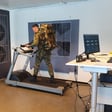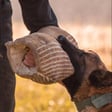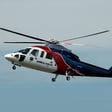Introduction and Guest Background
00:00:01
The Jobs Podcast
Hey folks, you're listening to the jobs podcast. I'm your host, Tim Hendricks. And today we have Ross Garcia with us. Ross has a distinction of being a master diver with the Navy. And he's also the author of a really interesting book about master divers and all their adventures.
00:00:19
The Jobs Podcast
And it is called look through your face plate window. And I recommend that you look that book up. It's pretty interesting. Ross, thanks for joining me today.
00:00:28
Ross Garcia
Well, good to be here, man. I really appreciate the opportunity to get the word out there about Navy diving. really appreciate it.
00:00:35
The Jobs Podcast
Yeah, this is going to be fun. i don't know much other than you dive underwater, but that's where my, I mean, I really have a surface level to borrow a horrible pun, ah you know, knowledge of what your career is like. So let's start off with a little history of where you were born and kind of your upbringing and what made you pursue a career in the Navy.
Early Life and Path to Navy Diving
00:00:54
Ross Garcia
Well, he but first of all, i I had no idea before I entered the military that I would even think about being a Navy diver, much less work in the water.
00:01:06
Ross Garcia
I ah grew up in in Texas. like I spent my young life in Garland, Texas, and young and adult life near Corpus Christi, Texas. I call Alice, Texas, my hometown.
00:01:17
Ross Garcia
and i yeah I finished diesel mechanic school in Beville, Texas in 1984. And i worked in the oil field for a while here in Texas.
00:01:30
Ross Garcia
And in the mid to late 80s, we began refining imported oil. So put us out of a job in a nutshell. So I little bit too prideful to to stand in the unemployment line. So I kind of aimlessly ah wandered into the military, just looking for ah way to, to, to ah to support my family and and keep working. So I did. And, uh, look, I, I, my first duty station was Long Beach, California. And once I, uh, uh, got to my first duty station, I, I had no idea
00:02:06
Ross Garcia
a Navy dive program existed at the time. So I met, uh, some guy from one guy from Belize, Honduras, his name was Edwin Beaks. And he had a strange Caribbean accent. It was strange to me because I'd never, never left South Texas or Texas for that matter. And, and he was an interesting guy. He was, he was lean and mean. He was carved out like a, like a bar of soap.
00:02:30
Ross Garcia
fantastic shapey he got me ready for navy dive school and uh in 1991 i went to dive school and uh and the rest was kind of history from there still making history but man it seems like a lifetime ago
00:02:43
The Jobs Podcast
What type of physical preparation do you have to do? I mean, I'm sure you're doing a lot of swimming, but is there anything unique to the training that you would do to prepare yourself for a career as a diver?
Physical and Training Challenges in Navy Diving
00:02:54
Ross Garcia
ah you You really have to be in aerobic good aerobic shape.
00:03:01
Ross Garcia
A lot of running, swimming for sure. and Although we didn't swim a whole lot you know while you're in the water, you're just kind of working. I think swimming is mostly ah to ah to excel in your water confidence, your ability to be in the water all the time.
00:03:15
Ross Garcia
So it certainly kept me in shape.
00:03:18
Ross Garcia
And so, yeah, so if you are a good candidate for to be a Navy diver, somebody who played ball in high school, some kind of outdoor activity, yeah you know, it takes a lot of endurance for sure, but maybe not necessarily ah somebody, a power lifter or a ah bodybuilder, somebody who's really mastered their body weight with good endurance is is well is how I view the preparation for
00:03:47
The Jobs Podcast
So if you were a competitive swimmer or if you played water polo or something along those lines that was physical and you're in the water, that might give you a leg up.
00:03:52
Ross Garcia
Yes. Yes. Yeah, it's a good good alignment of preparation for sure.
00:03:58
The Jobs Podcast
So the dive aspect, when you first get into your training, official training in the Navy, do you do you run into a lot of people that, well, this isn't for me.
00:04:12
The Jobs Podcast
I didn't realize i was going to be, I thought I was comfortable with the water, but I don't think I am that far down. Or how does that?
00:04:19
Ross Garcia
oh Oh, yeah, for sure. For sure. you know what um You know, so it's not for everybody, for sure.
00:04:27
Ross Garcia
And I think for those who've who've been in the water, water polo is a really good preparation for for dive school, uh, cause you, you really gain that sense of water confidence.
00:04:39
Ross Garcia
But, uh, I would say that, uh, you know, the attrition rate, um, the attrition rate, maybe 25, 30%. I haven't really viewed those numbers and,
00:04:50
Ross Garcia
in a long time, but, uh, um, you, you really, really need to be prepared for, especially in then their early phases of of school. Cause that's really where they really assess your, your desire to be there and be a Navy diver because,
00:05:07
Ross Garcia
it is a teamwork, a teamwork career field, whether it's in the military or it's in the commercial industry. Uh, uh, so, so for sure, uh, the early, the early, the early part of training is all scuba related self-contained underwater breathing apparatus scuba and, uh, get a lot of water time.
00:05:27
Ross Garcia
You have to tread water a lot, stay afloat with, uh, uh, heavy, heavy tanks on your back. And, uh, The other part is um they assess how well you work with others, how well you follow orders, the attention to detail and maintaining scuba equipment.
00:05:48
Ross Garcia
And there's no, ah there' there's no, ah there's no exception. That's you're they all in or all out. So, yeah.
00:05:56
The Jobs Podcast
How long is the training that you go through to first get involved in the program?
00:05:59
Ross Garcia
yeah You know, what so, you know, when I went in, it was, it was about 10 weeks. i think it's a little longer now, 13 weeks. And you can expect to, during the course of the training, you know, in addition to the physical fitness activities.
00:06:17
Ross Garcia
ah do you You learn about diving physics, the gas laws, a lot about diving life equipment maintenance ah ah to include working with oxygen, of pure oxygen, how to mix gases, how to work with compressors, ah dive compressors and maintain air cleanliness.
00:06:41
Ross Garcia
And then there's ah the the unique part about of it, and I think the best part of it is ah learning a little bit of of hyperbaric oxygen medicine ah because part of part of being a diver when you when you don the helmet and you dive deep you have to be prepared to to exit the water quickly and enter a recompression chamber so you learn how to operate a recompression chamber as part of fulfilling decompression protocols and And you really have to be spot on on what you're doing. You have to have to really know what you're doing with without exception.
00:07:16
Ross Garcia
So, yeah. And go ahead.
00:07:17
The Jobs Podcast
i got it I got a couple of questions and these are very basic questions. They're just kind of kind of a rapid fire kind of a deal.
00:07:24
The Jobs Podcast
How deep do you go when you are certified to be a Navy diver?
00:07:30
The Jobs Podcast
Is there a depth limit that you have?
00:07:33
Ross Garcia
Well, so the um there there are some limitations. It depends ah depends on the duty station you're at. to In in so very few commands, you can you can dive as deep as you know so a few hundred feet, five, six hundred feet.
00:07:50
Ross Garcia
That's called a saturation diving, where you stay on the bottom of the ocean floor for specific missions, mostly testing and evaluation.
00:07:52
The Jobs Podcast
and Okay.
00:07:59
Ross Garcia
ah You stay on there, you live in a habitat and you, um you undergo lengthy decompression obligations before
Diving Techniques and Protocols
00:08:08
Ross Garcia
you surface. So normally if you're diving on a surface supplied type ah application, that's where you don a helmet and you have an air hose supply in your dive helmet with the air that you need to, to breathe and do useful work.
00:08:24
Ross Garcia
Yeah. yeah usually ah You know, you qualify, 180 feet on air. You can go up to 285 feet, 300 feet on mixed gas, depending on what you got to do, what your mission is.
00:08:38
Ross Garcia
And then, of course, ah and a lot of the commands are shore duties are repair commands. And you typically, you're not any deeper than 60 feet because you're just you just need to go to the to the maximum depth of the ship's keel or submarine's hull to do the repairs, omit the repairs. So So it varies on, on capability and, and what, what, what your duty station needs you to do. So ah there's the variation right there.
00:09:05
The Jobs Podcast
Is the school, when you're done with the school, are you certified in all of those depths or does that as you, as basically you leave thinking, okay, I'm down to this depth, but if I want to do that, I have to go to a separate school or is it all in one place you're done?
00:09:21
Ross Garcia
No, no, it's ah really all in one place. You're done as far as depth.
00:09:26
The Jobs Podcast
and Okay. Mm-hmm.
00:09:27
Ross Garcia
Now, it's it's it's really specific to your command. So, for example, if I graduate to maybe second class dive school, I and come right out of boot camp, go to dive school.
00:09:41
Ross Garcia
If you are are assigned to, let's say, the Southwest Regional Maintenance Center in San Diego, California, where they conduct underwater repairs to ships and submarines, ah you you might go to a depth of 60 feet constantly or thirty mostly 30 feet because they're inside ballast tanks that are pressurized to a depth equal to 25 feet, feet.
00:10:06
Ross Garcia
Or if you get assignment to like a mobile dive and salvage unit one or two ones in Pearl Harbor, Hawaii, the other is in ah Virginia Beach, Virginia, you,
00:10:17
Ross Garcia
ah you um You can dive on mixed gas to deeper than 200 feet on a mixture of helium and oxygen. so So physically, you're you're expected to dive dive to those depths. And it's up to the diving supervisor to plan the decompression obligations to make sure We do everything we can to avoid decompression sickness or other other injuries that might occur like arterial gas embolisms.
00:10:49
Ross Garcia
ah for sure you're you're capable of diving to deeper depths for sure once you once you graduate dive school if you go to if you choose to be a saturation diver you you go to the experimental diving unit there in panama city florida and where they conduct ah saturation dives in in uh uh recompression chambers and the the guys will stay down there for days Testing equipment, doing experiments, or maybe developing other decompression tables for certain applications you know, whatever they need to do to to fulfill their obligations.
00:11:24
The Jobs Podcast
When we were talking before the interview started, you brought up a good point that I didn't realize is that you, and you kind of highlighted it a second ago when you said, if you come out of bootcamp and you go right to dive school, I was under the impression before we spoke that you had to be a certain rank before you could even apply for ah dive school.
00:11:47
The Jobs Podcast
But that's, can you elaborate on what we were talking about earlier?
00:11:50
Ross Garcia
Sure, sure. You know, so during my time, you had to you had to go to a a yeah ah skilled school, Navy service school first before you applied to dive school and serve a little bit of time in the fleet. Now you can go to boot camp.
00:12:05
Ross Garcia
come out of boot camp and then go straight in the dive school. And, you know, so you, you progress through your rank by taking tests examination test, examination tests to promote, uh, from E1 to E2, all the way to, E6 that's, uh, in the Navy, that's first class petty officer.
00:12:27
Ross Garcia
And to promote to the rank of or chief petty officer, you are boarded. so ah So all the way from the time you get out of dive school, you take tests to advance. Of course, you're evaluated by your team.
00:12:46
Ross Garcia
ah superiors on your performance so ah so to perform well to learn your skill and apply it well and to oh and to master all the all the skills that need to happen before you attain qualifications for example the qualification route is different from progressing in rank so when you get out of dive of school you earn the dive pin a second class diver Now you get that pin, then you got to go to your first command and whatever those skill sets are at the first command, for example, at the mobile dive and salvage units.
00:13:22
Ross Garcia
You have to master all the comprehensive skills in salvaging harbor clearance, mixed gas and recompression chamber operation. There's some expeditionary skills there, too.
00:13:34
Ross Garcia
So you have to master all those in a training and qualification program to maintain your second-class
Team Structures and Mission Tasks
00:13:40
Ross Garcia
dive pin. That's called the Diving and Salvage Warfare Specialist pin. And you transfer to another command, and as long as you as long as you ah perform well, you progress through the ranks.
00:13:55
Ross Garcia
And the ah command ah master divers and the fleet master divers are convinced that you might make a good diving supervisor. So they'll send you to first class dive school. The first class dive school is a, once you graduate from there, you learn, ah well what you learn there is, is how to supervise dives, how to, how to calculate gas, uh, uh, consumptions, enough gas for long missions,
00:14:22
Ross Garcia
ah some diving supervisory skills. And so once you make first class diver, you're expected to to lead dive teams autonomously. And so once you make rank or you're promoted to chief petty officer, that puts you in a position where to where a seasoned first-class diver, chief petty officer, can request to be evaluated by the Navy master diver community to qualify master diver. It's not a school.
00:14:56
Ross Garcia
It is an evaluation of all the master divers to see if you have the skills, mostly the comprehensive skills to to maintain an excellence under pressure to resolve the most challenging situation that occur.
00:15:14
Ross Garcia
And it's an evaluation where drills are imposed on you. actually go out to see your diving real men and women, sons and daughters of our country. You put them in the water, they impose some dive drill scenarios, and you have to successfully pass them, ah not just barely or just getting by. There's no D minuses or D pluses. You really have to score a pluses all the time to get through there.
00:15:41
Ross Garcia
ah Because you're you're trusted with other people's sons and daughters in the water. So, you know, yeah you know, so ah so there's the difference.
00:15:46
The Jobs Podcast
Yeah, that's important.
00:15:49
Ross Garcia
There's rank and qualification. And the threshold is when you obtain the rank of chief petty officer, that's E7. You that puts you in the the but prequalification requisite to apply to be evaluated to be a Navy master diver.
00:16:07
The Jobs Podcast
You had mentioned that you would be in charge of a dive team. Is there a certain number of personnel that are assigned to a team? Is it typically five, 10, 15, or how does that break down?
00:16:19
Ross Garcia
Well, to to it to a scuba team, it's a ah normally five people, six people, minimum of of four. And i'm kind of I'm kind of recalling some old ah and dive manual revisions, older revisions here. It could be different now, but it's about the same.
00:16:37
Ross Garcia
And when you have a surface-supplied team, you need at least... You need at least seven guys or for a or six people to do some underwater repairs.
00:16:48
Ross Garcia
if you're If you got a big ah big, big salvage project, you'll need at least a team of ah three teams of 10, 12. Usually a salvage, a deployed salvage company is 17 people. That's 16 enlisted. That includes a master diver and then one dive-in officer.
00:17:10
Ross Garcia
And so it depends on the mission. For example, we had on the, in 2007, we had, we responded to the Minnesota bridge collapse on August 1st, 2007.
00:17:24
Ross Garcia
So, The mission was pretty big. It was the name of that um that a particular skill set was Harbor Clearance. So in addition to recovering victims, we had to to clear the rubble, restore the commercial waterway.
00:17:40
Ross Garcia
ah So that took us three teams of, ah we had three teams of 10. So we had 30 Navy divers out there. and And of course, ah since it was high profile, we we had Navy divers, not only from the Navy, but from from the Army and some other branches, Coast Guard, come get some in-water time to help her relieve the the stresses of of the single dive teams.
00:18:04
Ross Garcia
So it's just it's just dependent. to and Another mission that's always referred to out there is the USS Monitor Recovery Program. That occurred in the late nineties, three, three years to recover the, uh, the monitor, the, uh, ironclad monitor was a, uh, civil war ship that sank off the coast of Moorhead city, North Carolina. And, uh, so there's teams, dive teams constantly diving around the clock.
00:18:31
Ross Garcia
and on a salvage and rescue ship with some support craft. And so you needed at least 30 people at least to to run the yeah ah surface supplied teams and the recompression chamber because they're applying the recompression, surface decompression ah techniques to safely decompress the Navy
Decompression and Hyperbaric Processes
00:18:54
Ross Garcia
divers. And So just it's just mission dependent for a saturation dive. It takes a big crew, not only the crew to ah to get underwater to submerge for days, but also the support craft up above that tethers the the bottom habitat to to ensure that they've got plenty of gas communications.
00:19:15
Ross Garcia
And that involves a ship, always involves a ship. So that's ah that's a pretty big that's a pretty big call there are people to to get that done.
00:19:24
The Jobs Podcast
This may be you use the term mission specific and my question may fall under that umbrella, but do you have a certain time limit that you can be in the water like to use the the bridge collapse example that you brought up a moment ago?
00:19:39
The Jobs Podcast
Did you go inside like a shift work kind of a deal and then you're in the decompression and you're off for a day or i don't know how that works.
00:19:45
Ross Garcia
Well, so, so, uh, decompression is depth and time dependent. So if you, if you are, let's say at a hundred feet and a feet of seawater and you spend, let's say a half an hour there, you might, you're going to run into some decompression obligations, uh,
00:19:51
The Jobs Podcast
and Okay.
00:20:04
Ross Garcia
in water decompression or, or if that's opposed to the Minnesota bridge collapse, the water and the maximum water depth is about 25 feet, 25 feet of water. So we stayed in no decompression obligations, you know, the entire time.
00:20:21
Ross Garcia
But when you're on a, when you're recovering an aircraft off the bottom of the ocean floor and it's in 235 feet seawater like the USS or two hundred and eighteen feet of seawater like the uss monitor was you you have to plan for ah conducting some in-water decompression stops and then leave your last ah last stop in the water usually 50 or 40 feet of seawater get the guys up and over on deck they better undress take some five you get you can't exceed five minutes but at the time you leave your last stop
00:20:56
Ross Garcia
to get them to 50 feet of seawater in the chambers. So there's a lot of, it really is something to, to, to watch, to, to see the surface decompression obligations and then get those guys in the recompression chamber, press them to 50 feet of seawater and to make sure those are up. takes a lot of teamwork. So, so it's always time and depth dependent. So, and, and that just depends on what the mission is and where you're at in the world.
00:21:22
The Jobs Podcast
The example that you used where they came up from 200 and think you said 17 feet of water. think you said seventeen feet of water and To use that example, when someone is in a decompression chamber, how long would they need to be in that in order to be safe to exit?
00:21:38
Ross Garcia
it's a it's ah It's also it's depth and time dependent.
00:21:44
Ross Garcia
ah For example, if it they it stayed down there for 15 minutes, it's quite possible that they could fulfill all their decompression chamber obligations in the water.
00:21:55
Ross Garcia
If they were 20 minutes, they would place them in a yeah ah in more time to fulfill decompression obligations in the water.
00:22:07
Ross Garcia
So the diving supervisor may elect to remove them from the water, get them undressed, get them in the recompression chamber for a certain amount of time to fulfill those decompression obligations. So if they're in the water for 30 minutes at that depth, it might, they could be there for an hour, hour and a half.
00:22:27
Ross Garcia
If they're in there for less time, they'd maybe 25 minutes, maybe 15 minutes. So it's always depth and time dependent. So, uh, There's a, in the U.S. Navy dive manual, there's a set of decompression ah schedules. We call them schedules, tables and schedules.
00:22:45
Ross Garcia
ah The table is the depth, and then the schedule is how long have they been under in the water. And when they leave the bottom, that's your bottom time. So you look at the the table and schedule, and that schedule will tell tell the diving supervisor how much decompression obligation they have to undergo to safely decompress to avoid decompression sickness.
00:23:11
Ross Garcia
And so, again, it's depth and timeme to time dependent. right
00:23:15
The Jobs Podcast
The inside of hyperbaric chamber, is it just a, is it a cot in there or a chair with some books or they just kind of have to pass the time, right?
00:23:25
Ross Garcia
well yeah you know it seems like in my experience by the time really goes by quick the the oxygen periods they so they're breathing oxygen inside the re decompression chamber recompression chamber is
00:23:40
Ross Garcia
proper term you know so uh they'll have uh maybe 20 or 30 minute oxygen periods and then they'll have to take an air break to avoid the symptoms of central nervous system oxygen toxicity and usually there's no books or there's no no uh
00:24:00
Ross Garcia
No, no additional one ah thing.
00:24:03
The Jobs Podcast
entertainment or anything.
00:24:04
Ross Garcia
Yeah. You know, sometimes some chambers, if they're, you know, and certainly not in the Navy, there's no television or anything like that. So, you know, usually what happens when you're inside the recompression chamber and you're fulfilling decompression obligations, there's always, there was always a trained inside tender we're always monitoring for symptoms that may emerge of decompression sickness type one or two one is mostly pain type two is maybe neurological symptoms we're always monitoring for anything that may emerge during decompression and of course we're always you know through the through the the mask we're always talking about how the dive went you know
00:24:35
The Jobs Podcast
Thank you.
00:24:51
Ross Garcia
and But most of the time, we're just relaxing. The time goes by pretty quick inside inside ah during surface decompression, which is different from treating somebody who does come up with a symptom that's a lot longer.
00:25:06
Ross Garcia
But even that time goes by pretty quick, too.
00:25:10
The Jobs Podcast
Now what you're treating the the term is the bins, correct? Is that if you come up too quick, you'll get the bins?
00:25:15
Ross Garcia
that's right uh so there's uh two two uh uh two illnesses that we look for arterial gas embolism and decompression sickness essentially essentially those two have the same symptoms uh serious decompression sickness and arterial gas symbolism uh and they they are they both involve the emboli what we call them boli or bubbles that come out of solution or or wind up in the in the circulatory system somehow it's how that bubble manifests inside the circulatory system for example arterial gas symbolism is
00:25:46
The Jobs Podcast
Thank you.
00:25:56
Ross Garcia
is a rupture of the alveoli the air sacs in your lungs and that happens while you're ascending that emboli could become lodged inside your arterial system and the first place that blood goes to after it leaves the lungs is your heart your your brain and that that emboli could cause um could cause a stoppage of blood flow to those areas and those those develop neurological symptoms very seriously usually they're usually dramatic and they and if we catch them right in the first 10 20 minutes we we can recompress somebody and and they'll be okay decompression sickness happens when you ascend too fast and we always we always refer to henry's law the henry's gas law
00:26:43
Ross Garcia
And if you come up too fast, those bubbles will come out of solution, usually in your venial system, and they'll they'll begin to block ah block blood flow to um tissues in your in your body, causing you pain, mostly pain. But if it gets those bubbles get lodged in your in your spinal cord or brain, they they cause neurological symptoms. So...
00:27:05
Ross Garcia
And even if you follow those ah decompression tables to the T, ah you're still you're still ah susceptible to decompression sickness. Very rare.
00:27:16
Ross Garcia
ah Usually when when when folks are they become injured due to decompression sickness, it's usually because they missed a decompression obligation or They ignored it or ora or something maybe catastrophic happened where they had to, maybe they they came and pinned underwater and it took a little time to get out of the get out of a entrapment or something like that. And then they had to go into a long ah exceptional exposure decompression obligation.
00:27:48
Ross Garcia
But other than that, usually ah if ah you're in good physical condition, especially aerobically and where you can breathe really good, ah you can really avoid those avoid those instances of decompression sickness.
Career Opportunities in Hyperbaric Therapy
00:28:01
Ross Garcia
I hope that made sense. Mm-hmm.
00:28:03
The Jobs Podcast
No, it did. i didn't really know exactly what was going on and i'm I'm landlocked.
00:28:07
The Jobs Podcast
We don't deal with hyperbaric chambers around here.
00:28:09
The Jobs Podcast
Although I do think there are some wound care centers that use those hyperbaric chambers for treating wounds, correct?
00:28:17
The Jobs Podcast
Correct.
00:28:17
Ross Garcia
oh Oh, yes. In fact, I really encourage, you know, since we're talking about jobs, if you go on the if you go in the military and you become a Navy diver, you know, you know I always encourage somebody who enters military service to work.
00:28:37
Ross Garcia
to enter a career field where you can use that in the civilian life, you know? So one thing about Navy diving is, is don't get me wrong.
00:28:46
Ross Garcia
I had a great time. probably wouldn't have done anything else in the Navy. And now that I look back, but, uh, you know, Navy diving, diving in the ocean is for young people.
00:28:57
Ross Garcia
You know, uh, once you, once you, were once you approach retirement age in the military career, you're expected
00:29:05
Ross Garcia
to supervise and lead when you become the master diver, you, you're expected to lead not only just dive teams, but, uh, uh, things involving logistics in Navy diving and, uh, training in Navy diving. So, you know, so you need to be, ah you need to be a good manager. So, uh, but, uh, but if I think right now about the way I feel now, there's no way I could, I could do half that, half those things I did when I was in my twenties,
00:29:35
Ross Garcia
You know, for sure.
00:29:36
Ross Garcia
And then, uh, but, uh, one of the good career fields, I think I encourage Navy divers or anybody in the, in the, even in the commercial dive field, I, I really encourage them to, as they go through their dive training to,
00:29:52
Ross Garcia
to uh to look into the undersea hyperbaric medical society and become a certified hyperbaric technic uh technologist now there's no regulation that you have to be a certified hyperbaric technician or a specialist um but those are good career fields for navy divers and and uh and what you really learn is to operate uh mono place a mono place recompression chambers is a recompression chamber where only one patient goes inside and they usually breathe the compressed usually the chamber is compressed with 100 oxygen to help heal wounds or radiation ah radiation injuries after you get treated for cancer uh it's just it's just just a phenomenal career field to get into and and uh
00:30:46
Ross Garcia
that's really what I really encourage everybody to do. If they go to, to go to any, any dive school, even if they're, if they, if they want to be a a recreational diver, um, like a, a PADI trainer, PADI master diver, ah now a NALY master diver.
00:31:05
Ross Garcia
I think in parallel, it's a good idea to, to obtain ah the skills of a hyperbaric recompression chamber operator, because it's a, it's a really, it's an emerging industry and it's only going to, it's only going to grow as we, uh, as we, uh, try to try to keep our health population healthier.
00:31:26
Ross Garcia
ah You know, keep get people, the other indications for hyperbaric oxygen therapy is diabetic foot ulcers, irradiation cystitis for for those men who who've undergone a lot of lot of raation radiation therapy for prostate cancer. And usually usually those those folks who've had radiation in the groin area,
00:31:54
Ross Garcia
they experience degradation and the ability to ah to urinate properly and some what's really incredible about is you can have radiation therapy 12 years later not even know that hyperbarics existed to help restore your normality in this field and 12 years later ah especially in the men i i can't really speak too much for for the women but the men experience almost full normality restored
00:32:06
The Jobs Podcast
Yeah. Really?
00:32:22
Ross Garcia
and urination and bowel movement.
00:32:25
Ross Garcia
And tell you, if you, I tell you, if you've had radiation therapy and in your growing area and, and you experience a, a, a blood clotting and urinating urination.
00:32:39
Ross Garcia
And if you, if you're going to go undergo radiation therapy in that, in that area, you know, and it's upcoming and, uh, really, really strongly encourage those who are going to do that undergo radiation therapy to look in to post treatment of radiation therapy, even if you have radiation ah therapy to other parts of your body that creates a radiation, a necrosis, a degradation of skin cells.
00:33:08
Ross Garcia
And normally and in young men and women, If you're in good health, that'll restore over time. But for some people, it's really difficult to to restore the tissue area.
00:33:19
Ross Garcia
And hyperbaric oxygen therapy really, really accelerates that to to get that closed up. So that's that's an encouraging field that I encourage all divers to to get into. And I'll tell you this, the industry right now really looks for, they look for ah nurses, m as and LVNs to to to really manage that career field. But I tell you, I know people may oppose me on this opinion, but I really think that divers, Navy divers, or commercial divers who've operated recompression chambers in
00:33:57
Ross Garcia
in the field of, deep sea diving, ah they really understand what that patient is going through.
00:34:07
Ross Garcia
ah they, you know, so they, can they can, they understand the importance of watching that patient, not only in and the physiology behind how the patient is responding or what they're going through, but also The managing of the safety aspects of recompression chamber operations. So, so important that the, the, the medical industry doesn't really, really get to that or, and it's really, it's really difficult in my eyes for, for, to hire an operator of a recompression chamber to operate a chamber that,
00:34:43
Ross Garcia
And they really don't know um never experienced what's really happening inside the recompression chamber, you know, so it's, there's a lot of value there, a lot of value.
00:34:54
The Jobs Podcast
Well, that's the experience that you have from being in the inside and then operating it versus just this is how we're taught to run the machine.
00:35:03
Ross Garcia
Yeah, that's right. You know, when you, when you descend in the decompression chamber, just like descended in the water. It's you, you have to clear your ears. You have to equalize your ears. You have to equalize the cavity spaces.
00:35:15
Ross Garcia
And when you ascend, you never hold your breath and, and the, ah and an experienced, um, an experienced diver or experienced recompression chamber operator, who's actually administered, ah therapy inside a chamber.
00:35:32
Ross Garcia
They understand and they know it exactly what's going on. So, ah you know, it's just, I feel strongly about that. I really do.
00:35:41
The Jobs Podcast
Yeah. Let's talk about the job that you do when you're underwater. Is there one, you've mentioned salvage and harbor clearing and and repair. I'm getting the impression that there's a lot of cutting. I'm assuming it's some kind kind of a torch, underwater torch, a lot of welding, underwater welding.
00:36:00
The Jobs Podcast
Does that make up the bulk of what you do or are there just so many countless things?
00:36:05
Ross Garcia
ah think ah I think to be a good Navy diver or commercial diver, you have to have mechanical skill.
00:36:16
Ross Garcia
you know You have to have um the skill of ah a skill of a machinist, a mechanic, or a field mechanic is a primitive word, technician, technician,
00:36:29
Ross Garcia
is a better word, diesel technician, auto technician, an electrician.
00:36:37
Ross Garcia
you You really need to have those skills and and think of it as as diving, as an as an enabling capability to get you to the project.
00:36:49
Ross Garcia
That's the value of diving. You know, you you get that to
00:36:55
Ross Garcia
that Navy ship or that oiler, that delivers millions of gallons of oil to the port. And they have a, uh, an underwater appendage like a propeller or a,
00:37:09
Ross Garcia
or a pump that supplies cooling water to the boiler that has to be changed out. And i think of the times or the money lost if you had the dry dock, that that ship or vessel.
00:37:24
Ross Garcia
And the Navy, think about that destroyer or aircraft carrier ah that's ready that needs to be deployed to defend our nation. And they have a failure that requires dry docking. Think of all the the money and time that's spent. So that's what diving is. It it enables you to avoid in the, in the underwater repair industry, enables you to avoid those costly ae situations where you got to pull something from the water and do its repairs in a shipyard or something like that.
00:37:58
Ross Garcia
If you can do it in the water, you can save a, you can save some mission time or downtime.
Diving Equipment and Skills
00:38:05
Ross Garcia
And that's the, that's the value. The other the other other thing is the confidence to to clear debris.
00:38:14
Ross Garcia
there There is some explosive training that you that you that's available at certain certain commands, certain um ah missions. But overall, having a good mechanical ability is is really what is required.
00:38:29
Ross Garcia
Even in the... even in the yeah in the recreational industry, you really got to have some, some mechanical skills that, you know, what what would you do if you didn't have mechanical skills? I, a good friend of mine used to tell me, he used to tell me that, look, if you don't have any, any the other skills besides ah turning wrenches or being able to troubleshoot or think underwater, you're the only thing you are is just an underwater helmet operator. So that's that's not much good to anybody.
00:38:58
The Jobs Podcast
You know, one question I am curious about, that helmet, that's it's such an iconic image when you see one of those but diving helmets, the big steel ones or metal ones, whatever, they're made out of brass, I don't know.
00:39:09
Ross Garcia
yeah yeah well it depends on what area you're in now now me i i i i did not work in the mark five deep sea diving suit and dress that's a little before my time but i i got to wear one in in a in an opportunity to get in the water just i just i just did it to uh
00:39:11
The Jobs Podcast
um What do those things weigh?
00:39:26
The Jobs Podcast
and Okay.
00:39:35
Ross Garcia
i was in a ah I was in a port off of in ah in an area off of Hawaii where the guy just offered you a chance to don the deep sea diving suit just to take a picture, get underwater.
00:39:49
Ross Garcia
And man, I tell you, i' I'm glad I didn't have to work in that suit. So... So all those guys who are listening to me, all, all, ah all, ah all of my guys who I've admired going through the career field, I'm, I'm good on you, but I'm glad those, I'm glad those days are over.
00:40:04
The Jobs Podcast
Yeah. What, what's the equipment that you typically use now?
00:40:10
The Jobs Podcast
You're not using tanks on your back. You're, you have a ah hard line, right?
00:40:14
Ross Garcia
All right, we have, so we we do dive scuba. that's ah that's ah That's a technique we use for just rapid deployment.
00:40:22
Ross Garcia
Usually when you're diving surface applied where it's a helmet, a hard, hard plastic Lexan helmet. and uh the the envelope is sealed around your neck with some uh with a neoprene a neoprene kind of rubber-like seal then you wear a wetsuit if you're in cold water you wear a hot water suits sometimes and uh you know so it's a little it's a lot more mobile than a than the old mark 5 deep sea diving suit where that thing
00:40:54
Ross Garcia
you had to you had to get in ah in a big envelope suit that covered your whole body including your your feet and your hands and and that suit uh it uh it was the mount for the mark five deep sea diving helmet you know so you're in an envelope and uh in In the modern days, there's there's there's Kirby, what we call Kirby Morgan rigs. Kirby Morgan is a brand name.
00:41:21
Ross Garcia
And the the name of the rigs that we use are and during my time was a Superlight 17, the Mark 21, MK 21, and the KM 37. Those are Kirby Morgan rigs that the Navy authorizes for use.
00:41:35
Ross Garcia
And, you know, they're they're a lot more mobile. They're they're lighter rigs. They're
Advice and Lessons from Experience
00:41:41
Ross Garcia
still heavy. They weigh about almost 50 pounds, but they're about one pound negatively buoyant and in the water.
00:41:50
Ross Garcia
But it makes for a lot more mobile, more agile. a Navy diver than the old Mark five deep sea diving suit. There's now there's full, there's full face mask, scuba mask that we use. and Those are the Mark 20 mass that we use to dive inside ballast tanks and keep us safe while the atmosphere is gas freed.
00:42:19
Ross Garcia
When you get inside an enclosed space that those enclosed spaces have to be gas freed, gaskets tested. before we can take off our masks. And yeah, so there' that's it in a nutshell. It was pretty modern stuff. A lot of technology out there, but the physics is still the same.
00:42:40
The Jobs Podcast
If you were just starting out, if someone came to you and said, Hey, I'm going to join the Navy. I want to be, eventually I want to be what you are, a master Navy diver. What advice can you give me to, you know, cause we all make mistakes. We all do things looking back, go, I shouldn't have done that. I should have done this.
00:42:58
The Jobs Podcast
What advice would you give somebody to excel in your career?
00:43:04
Ross Garcia
Well, do your best and do your, do your very best for sure.
00:43:08
Ross Garcia
I mean, in to be a Navy diver, first of all, you have to be in good shape and you have to have a lot of confidence in yourself, build the confidence in yourself.
00:43:22
Ross Garcia
And that means learn everything, not just how it operates, but When you operate it, what is everything else doing around you?
00:43:34
Ross Garcia
And, you know, you had mentioned my book when you opened up here in this podcast. And one of the things I write about is the evolution to becoming operators in just about every field in America, an operator versus a craft master, being a master at your craft.
00:43:57
Ross Garcia
And you want to really master ah the craft of Navy diving, because it enables you to critically think not only in day to day routine operations to, to be efficient in time management.
00:44:14
Ross Garcia
But it enables you to critically think in those time critical and emergent and emergent situations where you understand when something's going wrong,
00:44:25
Ross Garcia
that your your brain is already enabled to solve the problem before you even get there uh to to deal with the casualty so i encourage you to i would encourage somebody who wants to be a navy diver you have to be become a master at your craft and you you really want to do everything you can to progress uh now being a being a master diver is not for everybody You know, you have to be able to lead people without a doubt.
00:45:01
Ross Garcia
you it's you have to be, you can't be indecisive. You have to be decisive. and and And then we need, you know, we need those first class divers who are good managers of maintenance.
00:45:14
Ross Garcia
are who are, who are good at a life cycle management and in Navy dive, a lot of maintenance, lot of quality assurance maintenance to keep the gear safe. And there's no, there's no, ah ah there's no trying to think of it.
00:45:32
The Jobs Podcast
there's no good There's no good enough. It's kind of like a guy that is packaging a parachute.
00:45:34
Ross Garcia
It's right. You've exactly, exactly, exactly.
00:45:37
The Jobs Podcast
You either get it right or it's wrong. There's no, well, that's good enough. And in your line of work, that's that seems like the perfect analogy for it.
00:45:45
Ross Garcia
that's, that's a, that's a, that was really, really good. you know, yeah, you know, you want to, yeah, you know, you want to have that reputation as the go-to guy.
00:45:50
The Jobs Podcast
I get it right sometimes.
00:45:55
Ross Garcia
and And, if you, if you If you don't want that, then and I really encourage you to to choose another field, please.
00:46:06
Ross Garcia
Because there's there's ah there's a lot of investment in taxpayers' dollars for to send somebody to dive school, you know, so that's...
00:46:15
The Jobs Podcast
One of the things that you were talking about there is you need to know what's going on, but then kind of the downstream effects. And, you know, if you push a button, you should know what hat, what is happening when you push that button.
00:46:27
Ross Garcia
That's right.
00:46:27
The Jobs Podcast
Not that if I just push it, then the light comes on over there. Well, why is the light coming on?
00:46:31
Ross Garcia
That's right.
00:46:32
The Jobs Podcast
Like you need to know everything essentially.
00:46:32
Ross Garcia
That's right. Right. Right.
00:46:36
Ross Garcia
That's right. I identify identify the push button people as operators.
00:46:41
Ross Garcia
the craftsman The craftsman knows exactly what's happening after they push that button.
00:46:47
The Jobs Podcast
And if the light doesn't come on what do they need to do to ensure that it does?
00:46:51
Ross Garcia
and Exactly. And the answer is not call a mechanic. You know, the answer is, the answer is, i know it's, I think I know it's a matter.
00:46:58
Ross Garcia
i'm going to go fix it. Right. Right.
00:47:00
The Jobs Podcast
Are most of the people in your line of work, ah is there a ah typical personality style, like mostly introverts, extroverts? I know we mentioned mechanically inclined. you've you've kind of You've kind of hammered that part home.
00:47:14
The Jobs Podcast
But do you get ah varied personalities, or is there a typical type of person that excels in Navy diving?
00:47:24
Ross Garcia
Well, you know, that's a great question. You know, i ah yeah I've seen them both. And, you know, the way the way an introvert myself...
00:47:37
Ross Garcia
You know, if it's something outside of Navy diving, you know, I'm pretty relaxed. You know, but when once I'm in the zone, I'm quick to respond to just about anything.
00:47:50
Ross Garcia
And that's really the same for an extrovert, somebody who's who's got a big personality, a lot of charisma. I've always been that quiet guy ah until it came time to dive. And I really think...
00:48:07
Ross Garcia
The one thing that really stands out is somebody, good friend of mine ah told me one time, a mentor of mine, yeah told me one time, what what does it he I asked him, or what does it take to be a ah master diver?
00:48:23
Ross Garcia
And he said, you got to be a good man, meaning man or woman. You got to be a good man. And that means take everything on board and don't take for granted that you're leading America's sons and daughters into harm's way.
00:48:43
Ross Garcia
And you, so, so to your question, everybody has to to take on board the sense of obligation to return that person back on deck safely.
00:48:57
Ross Garcia
You know, so, uh, you know, so I've seen both introverts, extroverts, uh,
00:49:03
Ross Garcia
you know, ah ego, ego status. I've seen people fail when they're over egoed, you know, there's no, ah you know, i think I've investigated diving accidents.
00:49:16
Ross Garcia
And I think, I think one of the contributing factors has always been over ego, doing things that you weren't prepared to do, but you thought you were.
00:49:29
The Jobs Podcast
That what you just said right there is something that I've spent my whole adult career around a large number of type A's in the fire service.
00:49:40
The Jobs Podcast
And I've rubbed elbows with law enforcement.
00:49:43
The Jobs Podcast
They're all type a all of them.
00:49:45
Ross Garcia
Mm-hmm. I hope, yeah.
00:49:46
The Jobs Podcast
And a lot of guys that were in the military that now are in the fire service. So yeah I've spent my my ah whole adult life career wise around a lot of driven people. And there is such a fine line to walk between confidence and arrogance.
00:50:03
The Jobs Podcast
And if you don't make the decision every day to keep that arrogance in check and maintain some resemblance of humility, life will hammer you.
00:50:15
The Jobs Podcast
And it's usually very unpleasant when it happens.
00:50:18
Ross Garcia
Yep. Spot on. Spot on.
00:50:20
The Jobs Podcast
Yeah. Now you also talked a second ago about, you've seen that, that arrogance make people have made mistakes because they bought into their own hype, so to speak.
00:50:32
The Jobs Podcast
But even folks that are trying their best will sometimes fail, sometimes make mistakes. We all do as human beings. What's your best advice to someone when they do make a mistake?
00:50:44
Ross Garcia
Well, you learn from it. You know, one thing one thing during my time, and why I really always refer back to my mentors,
00:50:54
Ross Garcia
ah we were allowed ah to fail, but our mentors didn't allow us to become failures.
00:50:58
The Jobs Podcast
Yeah. Ah.
00:51:04
Ross Garcia
So learn from your mistakes. Learn from, ah you know, so if you if you're prepared And yeah describe that you're all in or or you're all out.
00:51:18
Ross Garcia
If you're prepared and you have that attitude to want to be a master at your craft, if you have that drive, you know, you're your failures will probably be pretty small.
00:51:34
Ross Garcia
You know, so something breaks, uh, get something bigger.
00:51:38
Ross Garcia
Uh, but if you, if you don't have that improvement, constantly improvement attitude, those failures could be big where you can't recover.
00:51:52
Ross Garcia
And, you know, so you have to constantly, uh, write your own lessons learned and, and you combine that with wanting to be the best at your craft, the craft of Navy diving.
00:52:06
Ross Garcia
And, and then your failures, your failures will be your lessons learned and they won't be so, um, they won't be so, ah they won't cost you you, know, maybe, maybe a little time, you know, well, you know, we don't have all the time in the world, you know, our, you know, our lies will end sooner or later, but,
00:52:16
The Jobs Podcast
Yeah. Mm-hmm.
00:52:25
Ross Garcia
and But you have at least you can recoup some of that time by trying something else that'll work by learning from from your your failures. But if if you go into going to a mission, the Navy diving mission ah with with a half hearted attitude, it's the failures are going to be pretty big.
Memorable Underwater Experiences
00:52:47
The Jobs Podcast
What you said a second ago that you when you were um earlier on your career, you you know, your failures, they defined an event, they didn't define you as a person, you were allowed to, to fail, but it didn't own you, you learn from it.
00:53:02
The Jobs Podcast
And you're better because of it. That was what your supervisors tried to instill in you.
00:53:03
Ross Garcia
That's right.
00:53:06
Ross Garcia
that's That's right. That's right.
00:53:08
Ross Garcia
That's right. That's good leadership.
00:53:12
Ross Garcia
Leadership is a big part of it for sure.
00:53:14
The Jobs Podcast
You know, one question that I wanted to ask you was, you've spent a lot of time underwater at varying depths. You ever had anything come out of the blue, a set of teeth or something bump your leg or something that just made you wet your wetsuits?
00:53:28
Ross Garcia
I tell you, I remember one time I was on the bottom of the ocean floor. um This is in my younger days. and this great big fish...
00:53:40
Ross Garcia
i gone I don't know what the name of that fish is. i um It was not as big as my kitchen table. It came up slow. it's It had this great big eye looking at us and it just kind of drifted looking at us to see what we're doing.
00:53:56
Ross Garcia
And the only thing I could think of, I was wasting bottom time. And the only thing I could think of that big old fish swallowing me whole.
00:54:05
The Jobs Podcast
Good grief.
00:54:06
Ross Garcia
And, uh, but, you know, that was the only, only time on my island, any, any stories, uh, you know, that I have underwater animal stores. I've seen little sharks. I don't have any big shark stories to tell.
00:54:19
Ross Garcia
Um, no big shark stories on my good friend of mine. on Master Diver Rick Batua, he lives in Australia. He he runs and a yeah ah spearfishing company. He has this fantastic book called Breathe.
00:54:37
Ross Garcia
Just Breathe by Rick Petua. And and guy was ah that that guy had and rescued a good friend of his and in Australia from a shark attack.
00:54:49
Ross Garcia
Saved his life. he He was bleeding out, able to get him back to safety. And then couple years later, my friend Rick got a attack attacked by a shark. He was bleeding out.
00:55:00
Ross Garcia
And the same guy who he saved, saved him from that shark attack.
00:55:05
The Jobs Podcast
Now that's a friendship.
00:55:06
Ross Garcia
yeah And that's a good, it's ah it's a good book, Breathe. he's like
00:55:10
Ross Garcia
He's a good leader. It's on my website by Rick Batua. He's that guy is, he's, I think he's a, he's a master diver that, you know, a lot of us ah little younger guys, we aspire to be like, you know, just a solid person.
00:55:27
The Jobs Podcast
Yeah. What's it like... What's it like being, you know, most of us, i've I was certified to scuba dive many, many years ago, but I think the deepest I ever went was maybe 50 feet, 60 feet, something along those lines.
00:55:41
The Jobs Podcast
It was 30 plus years ago.
00:55:42
The Jobs Podcast
I don't remember, but just recreational scuba diving.
00:55:47
The Jobs Podcast
But when you're hundreds of feet down and you're on the bottom of the ocean where nobody ever is, what's the first time you go down that depth and you're standing or almost on the bottom of the ocean, what's that like?
00:56:01
Ross Garcia
it's ah It's an exhilarated experience.
00:56:04
The Jobs Podcast
Hmm. Yeah.
00:56:05
Ross Garcia
um you know i just You know, when I made my first real deep dive, it was you know I worked up to it. I did a lot of shallow diving, and usually when you the deeper you go, the darker it gets a little bit.
00:56:20
Ross Garcia
And, uh, you know, we just work up to it is the best way to approach those. and Anybody who's anybody who hasn't done it for a while and they, they just decided to go to 150 feet.
00:56:32
Ross Garcia
You know, you're really, you're really taking a risk because your body is like a machine too. And, you know, if you, once you, if you don't use it, you know, you know, you might, you might experience, you might have a bad experience.
00:56:45
Ross Garcia
So best thing to do is to work up to it, you know, get, stay shallow,
00:56:46
The Jobs Podcast
Yeah. Yeah.
00:56:50
Ross Garcia
where all the fish are, you know, make, and get in and out of the water, make repetitive dives and work your way up to, to, to go in deep. But that first time I went deep, uh, uh, was off the coast of Point Loma, California.
00:57:04
Ross Garcia
That was my qualification dive in Mark 12 deep sea, the deep sea diving suit.
00:57:10
Ross Garcia
And know walking on the bottom, it was just fabulous. In the kelp beds, the kelp beds look like a forest down there with just fish, colorful fish. The water is crystal clear off the coast of Southern California.
00:57:23
The Jobs Podcast
Mm-hmm. Hmm.
00:57:24
Ross Garcia
And it made for and and an impressionable experience. I can still see the Garibaldi, the orange fish, the state fish, the Garibaldi is just just as just as as if I was in the water yesterday.
00:57:38
Ross Garcia
And just see life everywhere. and me and my dive buddy, you know just we know, we just couldn't believe what we saw at that depth, you know. But it was just just fabulous.
Reflections on Navy Career and Future
00:57:51
Ross Garcia
know, that was my first time. and That was at 100 and, think 130 feet, Mm-hmm.
00:57:55
Ross Garcia
Mm-hmm. like a hundred and thirty feet i think
00:57:59
The Jobs Podcast
i yeah I lived in San Diego when I went to college. And so we used to go, when I got certified to scuba dive, it was, we went off of Mission Beach. We walked out and I think we only went 50 or 60 feet down, but I used to snorkel in La Jolla Cove and all that area.
00:58:10
Ross Garcia
Oh yeah. Oh yeah.
00:58:14
The Jobs Podcast
It's beautiful area out there to get in the water.
00:58:16
Ross Garcia
Oh yeah. Fantastic.
00:58:17
The Jobs Podcast
Cold though, cold.
00:58:19
Ross Garcia
but Before I went to dive school, I, I, I took a, a paddy course just so I could get ready for it, you know, and first dive I made was in Shaw's Cove right there in Laguna beach.
00:58:31
Ross Garcia
And, uh, it was, uh, it was, uh, if it was a successful dive, then, the guy who, uh, inspired me to go to dive school. Uh, we were out there doing night dives before we knew it, you know, looking for lobster and, uh, yeah.
00:58:47
The Jobs Podcast
Yeah, I remember that. Yep. All the flashlights in the water when you go out onto the shoreline.
00:58:51
Ross Garcia
Oh yeah. Yeah. So, uh, oh yeah. Just beautiful, beautiful water.
00:58:58
The Jobs Podcast
if you If somebody asked you what you like most about your job, is there one particular thing that you immediately gravitate towards?
00:59:07
Ross Garcia
i I think ah just about my job in the Navy is the friendships.
00:59:14
The Jobs Podcast
Yeah. Yeah.
00:59:15
Ross Garcia
When I started, the friendships that ultimately transformed into the leaderships and then back to the friendships that I enjoy right now, post-military career. we and There's ah two ah to organizations that I involved myself in. That's the Navy Diver Association Reunion that That happens every other year.
00:59:37
Ross Garcia
I'm involved in the scholarship program that and we have a very, very generous contributor ah to that scholarship program. and And then every other year I attend the Navy navy Master Diver Union.
00:59:51
Ross Garcia
and uh at uh in panama city beach florida there's the man in the sea museum that i encourage everybody to go to it's a fantastic uh museum history of of anything that goes on in the water and then and then we cap off the so the celebration at the at the navy ah coastal system station think it's the Called something else now, but the Navy base right there in Panama City, Florida, right there in the, in the pavilion, all the old guys get together from years ago. And ah my podcast, it inspired me to build a podcast called deep sea stories.
01:00:29
Ross Garcia
And so the friendships ah and of the people I made friends with that got us through the long, tough missions and ultimately the leadership, the leadership aspect I enjoyed.
01:00:43
Ross Garcia
ah enjoyed leading what I call America's sons and daughters, aunts and uncles, uh through dive missions and make them feel good about their themselves to get in and out of the water you feel that great sense of accomplishment that's what strengthens our friendships to and our bonds to two decades later gives us a reason to to call on each other to for a celebration to get together or just maybe just to talk to when folks are just feeling kind of lonely you know
01:01:17
The Jobs Podcast
Is there anything about your job that you could have done without? Every job has its downsides, but...
01:01:23
Ross Garcia
Well, um've I've got my lessons learned. I think, uh, oh, you know, uh, you know, in my book, I write about dealings with, uh, mainstream media, you know, uh, but, um, you know, I, I think if, if I could have gone back and, and did, i
01:01:47
Ross Garcia
I dove all over the world. i think, uh, I wish i I wish I had a cell phone during my tour. I would have had more pictures. Uh, you know, I tell everybody take pictures of what you're doing.
01:02:00
The Jobs Podcast
Yep. Mm-hmm.
01:02:02
Ross Garcia
I think in any career field or whatever you need, you need to take pictures.
01:02:06
Ross Garcia
But, uh, I guess that's about it really. I, I, uh, I really enjoyed ah my time. Well, we always had some bad moments for sure, but, uh, you know, uh, but, uh, really that's about it.
01:02:19
Ross Garcia
I wish I would have taken more pictures and, and, uh, there are some, there are some duty stations I wish I i would have gone to. but, uh, I still dove around the world as in the Persian Gulf.
01:02:31
Ross Garcia
I lived in Italy for two years, uh, with my youngest daughter.
01:02:37
Ross Garcia
I lived in San Diego for ah twice, so once ah once in the sea, from 99 to 2003. And then i I went back there as a government service employee, ah going back to the command that I was stationed at ah to manage the quality assurance programs ah for the Navy dive systems and the recompression chambers.
01:03:04
Ross Garcia
and a little bit different my second time around. Cause COVID kind of sent me back to South Texas where I'm from, but it was just a, just great and being in Southern California and the Coronado, the Coronado, California area is just, a man, just fantastic. Imperial beach.
01:03:22
Ross Garcia
It was, man, it was just fantastic down there. Really.
01:03:26
The Jobs Podcast
If anybody ever tells you to go to Black's Beach in San Diego, don't do it.
01:03:30
The Jobs Podcast
I had some guys tell me when I moved there, go check out Black's Beach.
01:03:34
The Jobs Podcast
Well, nobody told me it was a nudist beach.
01:03:36
The Jobs Podcast
And then I walked down in there was like, oh, good grief.
01:03:37
Ross Garcia
Yeah. I've heard that before. Never, never made it there.
01:03:40
Ross Garcia
Never made it there.
01:03:41
The Jobs Podcast
Yeah, they got me good. It's me and a bunch of old German guys. So I quickly packed up and left.
01:03:46
The Jobs Podcast
But yeah.
01:03:48
The Jobs Podcast
Hey, Ross, man, this was such an interesting interview. You've got a very unique career and your book that go ahead and tell everybody your website. It's a Navy Master Divers Adventure dot com. Did I get that right?
01:04:00
Ross Garcia
Yep. That's right. A Navy, no spaces, a Navy master divers adventure.com.
01:04:02
The Jobs Podcast
Okay. okay
01:04:06
Ross Garcia
And the name of my podcast is deep sea stories.
01:04:11
Ross Garcia
I think I got, I think I'm close to 20 podcasts on there now.
01:04:14
Ross Garcia
And then if you look at the store, you can see, you can pick up my book, um, and view through a face plate window adventures of a Navy master diver.
01:04:23
Ross Garcia
And then The other book I mentioned was Breathe by Master Diver Rick Petua. It's a great, great book, leadership book. And you'll see some other other books.
01:04:36
Ross Garcia
They're on my website. One by Mr. Robert Pizzini. He's the president of the Chamber of Commerce. He's a retired Navy diver slash explosive or disposal officer.
01:04:49
Ross Garcia
Mr. Robert Pizzini and his... Uh, the name of his book, I'm bringing it up right now. And you'll see my second book is, uh, the journey to Alice, Texas is my second book.
01:05:02
Ross Garcia
And, uh, the That's about how my my family migrated to from Mexico to to live in South Texas. And it's about how the generations of my great grandparents have, i'm through the through our our own will and self-determination, we've become um we become prosperous.
01:05:24
Ross Garcia
Self-determination is a big part of of a um the evolution of my family. You know, we don't get rich overnight. um So, you know, so self-determination, you know, doing better, doing something better, leave, leave the world a better place and than when you, than when you found it.
01:05:46
Ross Garcia
And the name of that book by Robert Pizzini is called Elevate Your Leadership.
01:05:51
Ross Garcia
Mr. Pizzini is a leadership speaker. He's the president of the Chamber of Commerce there in Virginia Beach, Virginia. and his program he gives leadership symposium he's a phenomenal influencer and and you also see other books here by mr len starbeck he's a he's a diving medical off uh diving medical technician um yeah a diving medical technician is like a hyperbaric oxygen therapist in the civilian sector and a good friend of mine mr uh michael gilbert
01:06:26
Ross Garcia
he wrote a book called foul to anchor where he talks about his navy career and navy diving career and then mr lewis busby ah did an interview with mr lewis busby his father was bastard the late master diver milford busby his who uh passed away way back in 19 early 1970s but he recalls the story about his father being a navy master diver it's Really, really, he's a professional writer. So he really brings out the ah motivation to pick up that book into the readers and me and my book, Faceplate Window.
01:07:02
Ross Garcia
I'm just an old retired guy to and didn't do the best I can to tell my story, you know, so, you know, so.
01:07:08
The Jobs Podcast
Well, Hey, anybody that serves in the military and makes a career out of it, you get my utmost respect.
01:07:14
The Jobs Podcast
I I've always admired the military. It wasn't a choice for me, but anybody that did it, I tip my hat to you. Thank you for your service. I know that's kind of overused phrase sometimes, but I genuinely mean it.
01:07:26
The Jobs Podcast
You've, you've earned your retirement and I hope it's a comfortable and relaxing one.
01:07:30
Ross Garcia
Well, it sure is. I do more now that I'm retired than I did when I was in active duty.
01:07:35
The Jobs Podcast
I've heard that. Yeah.
01:07:36
Ross Garcia
no you know i'm still ah i still I'm still a hyperbaric oxygen technician. I do some marketing for for our organization down here. And I go out there and I encourage people I try to ah try to motivate folks who've gone undergone cancer treatment.
01:07:52
Ross Garcia
You know, they've already and they are they've already been whipped by radiation therapy, and I try to motivate them. Hey, look, you know, you really could help your quality of life if you just to commit commit a couple of months to hyperbaric oxygen therapy.
01:08:06
Ross Garcia
So that's what I do in my here in my spare time.
01:08:09
The Jobs Podcast
Right on.
01:08:10
Ross Garcia
All right. All
01:08:11
The Jobs Podcast
Ross, thanks again, man. This was awesome. I really appreciate your time and I hope the rest of your day is a good one.
01:08:18
Ross Garcia
You too, man. Be safe out there. Really appreciate your time.
01:08:19
The Jobs Podcast
You bet.
01:08:20
Ross Garcia
Thank you, sir.
01:08:21
The Jobs Podcast
Take care.
01:08:21
Ross Garcia
Have a good one. Bye-bye.
Outro




















